HSBC 2011 Annual Report Download - page 424
Download and view the complete annual report
Please find page 424 of the 2011 HSBC annual report below. You can navigate through the pages in the report by either clicking on the pages listed below, or by using the keyword search tool below to find specific information within the annual report.-
 1
1 -
 2
2 -
 3
3 -
 4
4 -
 5
5 -
 6
6 -
 7
7 -
 8
8 -
 9
9 -
 10
10 -
 11
11 -
 12
12 -
 13
13 -
 14
14 -
 15
15 -
 16
16 -
 17
17 -
 18
18 -
 19
19 -
 20
20 -
 21
21 -
 22
22 -
 23
23 -
 24
24 -
 25
25 -
 26
26 -
 27
27 -
 28
28 -
 29
29 -
 30
30 -
 31
31 -
 32
32 -
 33
33 -
 34
34 -
 35
35 -
 36
36 -
 37
37 -
 38
38 -
 39
39 -
 40
40 -
 41
41 -
 42
42 -
 43
43 -
 44
44 -
 45
45 -
 46
46 -
 47
47 -
 48
48 -
 49
49 -
 50
50 -
 51
51 -
 52
52 -
 53
53 -
 54
54 -
 55
55 -
 56
56 -
 57
57 -
 58
58 -
 59
59 -
 60
60 -
 61
61 -
 62
62 -
 63
63 -
 64
64 -
 65
65 -
 66
66 -
 67
67 -
 68
68 -
 69
69 -
 70
70 -
 71
71 -
 72
72 -
 73
73 -
 74
74 -
 75
75 -
 76
76 -
 77
77 -
 78
78 -
 79
79 -
 80
80 -
 81
81 -
 82
82 -
 83
83 -
 84
84 -
 85
85 -
 86
86 -
 87
87 -
 88
88 -
 89
89 -
 90
90 -
 91
91 -
 92
92 -
 93
93 -
 94
94 -
 95
95 -
 96
96 -
 97
97 -
 98
98 -
 99
99 -
 100
100 -
 101
101 -
 102
102 -
 103
103 -
 104
104 -
 105
105 -
 106
106 -
 107
107 -
 108
108 -
 109
109 -
 110
110 -
 111
111 -
 112
112 -
 113
113 -
 114
114 -
 115
115 -
 116
116 -
 117
117 -
 118
118 -
 119
119 -
 120
120 -
 121
121 -
 122
122 -
 123
123 -
 124
124 -
 125
125 -
 126
126 -
 127
127 -
 128
128 -
 129
129 -
 130
130 -
 131
131 -
 132
132 -
 133
133 -
 134
134 -
 135
135 -
 136
136 -
 137
137 -
 138
138 -
 139
139 -
 140
140 -
 141
141 -
 142
142 -
 143
143 -
 144
144 -
 145
145 -
 146
146 -
 147
147 -
 148
148 -
 149
149 -
 150
150 -
 151
151 -
 152
152 -
 153
153 -
 154
154 -
 155
155 -
 156
156 -
 157
157 -
 158
158 -
 159
159 -
 160
160 -
 161
161 -
 162
162 -
 163
163 -
 164
164 -
 165
165 -
 166
166 -
 167
167 -
 168
168 -
 169
169 -
 170
170 -
 171
171 -
 172
172 -
 173
173 -
 174
174 -
 175
175 -
 176
176 -
 177
177 -
 178
178 -
 179
179 -
 180
180 -
 181
181 -
 182
182 -
 183
183 -
 184
184 -
 185
185 -
 186
186 -
 187
187 -
 188
188 -
 189
189 -
 190
190 -
 191
191 -
 192
192 -
 193
193 -
 194
194 -
 195
195 -
 196
196 -
 197
197 -
 198
198 -
 199
199 -
 200
200 -
 201
201 -
 202
202 -
 203
203 -
 204
204 -
 205
205 -
 206
206 -
 207
207 -
 208
208 -
 209
209 -
 210
210 -
 211
211 -
 212
212 -
 213
213 -
 214
214 -
 215
215 -
 216
216 -
 217
217 -
 218
218 -
 219
219 -
 220
220 -
 221
221 -
 222
222 -
 223
223 -
 224
224 -
 225
225 -
 226
226 -
 227
227 -
 228
228 -
 229
229 -
 230
230 -
 231
231 -
 232
232 -
 233
233 -
 234
234 -
 235
235 -
 236
236 -
 237
237 -
 238
238 -
 239
239 -
 240
240 -
 241
241 -
 242
242 -
 243
243 -
 244
244 -
 245
245 -
 246
246 -
 247
247 -
 248
248 -
 249
249 -
 250
250 -
 251
251 -
 252
252 -
 253
253 -
 254
254 -
 255
255 -
 256
256 -
 257
257 -
 258
258 -
 259
259 -
 260
260 -
 261
261 -
 262
262 -
 263
263 -
 264
264 -
 265
265 -
 266
266 -
 267
267 -
 268
268 -
 269
269 -
 270
270 -
 271
271 -
 272
272 -
 273
273 -
 274
274 -
 275
275 -
 276
276 -
 277
277 -
 278
278 -
 279
279 -
 280
280 -
 281
281 -
 282
282 -
 283
283 -
 284
284 -
 285
285 -
 286
286 -
 287
287 -
 288
288 -
 289
289 -
 290
290 -
 291
291 -
 292
292 -
 293
293 -
 294
294 -
 295
295 -
 296
296 -
 297
297 -
 298
298 -
 299
299 -
 300
300 -
 301
301 -
 302
302 -
 303
303 -
 304
304 -
 305
305 -
 306
306 -
 307
307 -
 308
308 -
 309
309 -
 310
310 -
 311
311 -
 312
312 -
 313
313 -
 314
314 -
 315
315 -
 316
316 -
 317
317 -
 318
318 -
 319
319 -
 320
320 -
 321
321 -
 322
322 -
 323
323 -
 324
324 -
 325
325 -
 326
326 -
 327
327 -
 328
328 -
 329
329 -
 330
330 -
 331
331 -
 332
332 -
 333
333 -
 334
334 -
 335
335 -
 336
336 -
 337
337 -
 338
338 -
 339
339 -
 340
340 -
 341
341 -
 342
342 -
 343
343 -
 344
344 -
 345
345 -
 346
346 -
 347
347 -
 348
348 -
 349
349 -
 350
350 -
 351
351 -
 352
352 -
 353
353 -
 354
354 -
 355
355 -
 356
356 -
 357
357 -
 358
358 -
 359
359 -
 360
360 -
 361
361 -
 362
362 -
 363
363 -
 364
364 -
 365
365 -
 366
366 -
 367
367 -
 368
368 -
 369
369 -
 370
370 -
 371
371 -
 372
372 -
 373
373 -
 374
374 -
 375
375 -
 376
376 -
 377
377 -
 378
378 -
 379
379 -
 380
380 -
 381
381 -
 382
382 -
 383
383 -
 384
384 -
 385
385 -
 386
386 -
 387
387 -
 388
388 -
 389
389 -
 390
390 -
 391
391 -
 392
392 -
 393
393 -
 394
394 -
 395
395 -
 396
396 -
 397
397 -
 398
398 -
 399
399 -
 400
400 -
 401
401 -
 402
402 -
 403
403 -
 404
404 -
 405
405 -
 406
406 -
 407
407 -
 408
408 -
 409
409 -
 410
410 -
 411
411 -
 412
412 -
 413
413 -
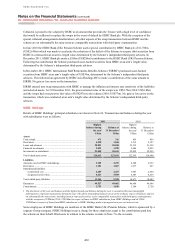 414
414 -
 415
415 -
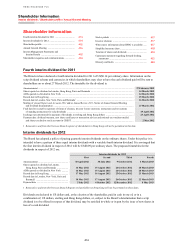 416
416 -
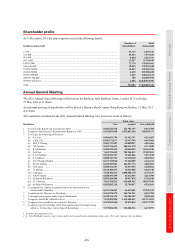 417
417 -
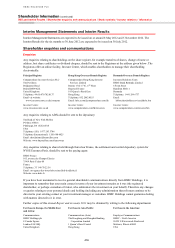 418
418 -
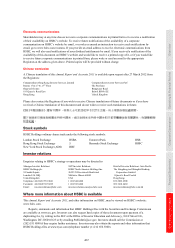 419
419 -
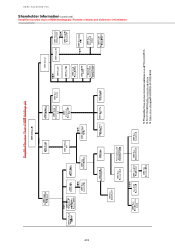 420
420 -
 421
421 -
 422
422 -
 423
423 -
 424
424 -
 425
425 -
 426
426 -
 427
427 -
 428
428 -
 429
429 -
 430
430 -
 431
431 -
 432
432 -
 433
433 -
 434
434 -
 435
435 -
 436
436 -
 437
437 -
 438
438 -
 439
439 -
 440
440
 |
 |

HSBC HOLDINGS PLC
Shareholder Information (continued)
Cautionary statement regarding forward-looking statements / Glossary
422
Cautionary statement regarding
forward-looking statements
The Annual Report and Accounts 2011 contains
certain forward-looking statements with respect to
HSBC’s financial condition, results of operations
and business.
Statements that are not historical facts, including
statements about HSBC’s beliefs and expectations,
are forward-looking statements. Words such as
‘expects’, ‘anticipates’, ‘intends’, ‘plans’, ‘believes’,
‘seeks’, ‘estimates’, ‘potential’ and ‘reasonably
possible’, variations of these words and similar
expressions are intended to identify forward-looking
statements. These statements are based on current
plans, estimates and projections, and therefore undue
reliance should not be placed on them. Forward-
looking statements speak only as of the date they are
made. HSBC makes no commitment to revise or
update any forward-looking statements to reflect
events or circumstances occurring or existing after
the date of any forward-looking statements.
Written and/or oral forward-looking statements
may also be made in the periodic reports to the US
Securities and Exchange Commission, summary
financial statements to shareholders, proxy statements,
offering circulars and prospectuses, press releases
and other written materials, and in oral statements
made by HSBC’s Directors, officers or employees to
third parties, including financial analysts.
Forward-looking statements involve inherent
risks and uncertainties. Readers are cautioned that a
number of factors could cause actual results to differ,
in some instances materially, from those anticipated
or implied in any forward-looking statement. These
include, but are not limited to:
• changes in general economic conditions in the
markets in which we operate, such as continuing
or deepening recessions and fluctuations in
employment beyond those factored into
consensus forecasts; changes in foreign
exchange rates and interest rates; volatility in
equity markets; lack of liquidity in wholesale
funding markets; illiquidity and downward price
pressure in national real estate markets; adverse
changes in central banks’ policies with respect
to the provision of liquidity support to financial
markets; heightened market concerns over
sovereign creditworthiness in over-indebted
countries; adverse changes in the funding status
of public or private defined benefit pensions;
and consumer perception as to the continuing
availability of credit and price competition in
the market segments we serve;
• changes in government policy and regulation,
including the monetary, interest rate and other
policies of central banks and other regulatory
authorities; initiatives to change the size,
scope of activities and interconnectedness of
financial institutions in connection with the
implementation of stricter regulation of financial
institutions in key markets worldwide; revised
capital and liquidity benchmarks which could
serve to deleverage bank balance sheets and
lower returns available from the current business
model and portfolio mix; imposition of levies or
taxes designed to change business mix and risk
appetite; the practices, pricing or responsibilities
of financial institutions serving their consumer
markets; expropriation, nationalisation,
confiscation of assets and changes in legislation
relating to foreign ownership; changes in
bankruptcy legislation in the principal markets
in which we operate and the consequences
thereof; general changes in government policy
that may significantly influence investor
decisions; extraordinary government actions as a
result of current market turmoil; other
unfavourable political or diplomatic
developments producing social instability or
legal uncertainty which in turn may affect
demand for our products and services; the costs,
effects and outcomes of product regulatory
reviews, actions or litigation, including any
additional compliance requirements; and the
effects of competition in the markets where we
operate including increased competition from
non-bank financial services companies,
including securities firms; and
• factors specific to HSBC, including our success
in adequately identifying the risks we face, such
as the incidence of loan losses or delinquency,
and managing those risks (through account
management, hedging and other techniques).
Effective risk management depends on, among
other things, our ability through stress testing
and other techniques to prepare for events that
cannot be captured by the statistical models it
uses; and our success in addressing operational,
legal and regulatory, and litigation challenges.
